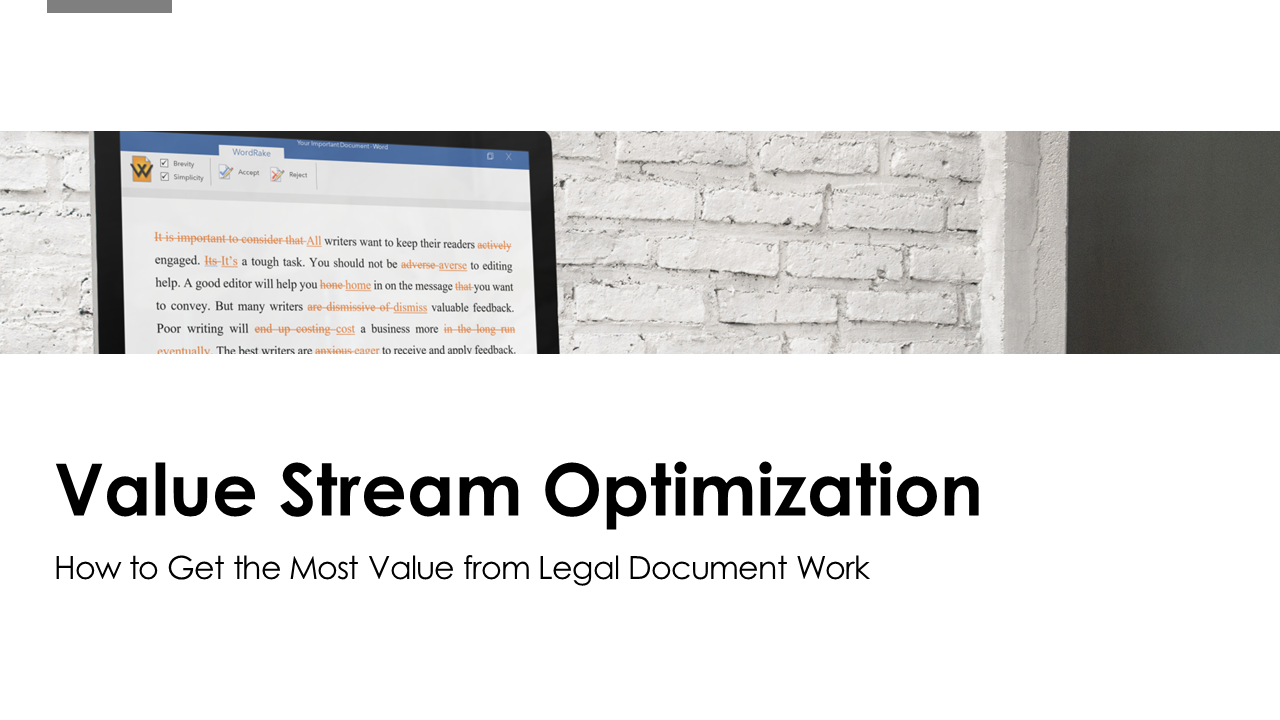Even the best writers fall back on common expressions that add unnecessary and repetitive words to their writing. This repeated information is most often added as time-related information to sentences in which the verb tense or another part of speech already shows the reader the time information.
Most serious writers want to break this bad habit, but they feel stuck because wordy expressions flow so naturally. We get it: It’s easy for familiarity to become desensitization. If you’d like to raise your awareness of wordy expressions, you’ll find them in the four types of time phrases we discuss below.
Consider these tips so you can keep redundancies from creeping into your drafts, then let WordRake find and trim these expressions for you.
1. Process Words with Present Progressive Tense
In English, the present progressive tense, which is also called the present continuous tense, shows that an activity is in progress or shows a temporary state of being. When writers use this tense, they don’t need adverbs or time expressions to show the same information.
Present Progressive Tense: I am running.
By deleting redundant expressions like these, WordRake helps writers deliver their message efficiently:
Our office is in the process of preparing a draft.
He was running and, in the process, tripped over a rock.
She is actively evaluating our options.
The teams are currently competing for the Red Pen Award.
2. General Time Expressions with Past Tense
If you think back to your Romance language lessons from high school, you may remember that the English past tense is less specific than some other languages’ past tense options. Even so, our simple past tense gives readers a lot of information, rendering expressions like at that time and back then unnecessary.
Simple Past Tense: I walked to the store.
With edits like these, WordRake reduces word count and makes your writing more powerful:
They previously voted against the bill in 2019.
Artifacts dating from the period prove that the port was one of the main trading posts in the country at that time.
After an initially a peaceful start to the king’s reign, he again began to extort money from the colonies.
Even the plaintiff’s own doctor initially diagnosed the plaintiff with the disease.
The doctor initially first diagnosed her with a respiratory virus.
3. Time Words and Expressions with Present Perfect Tense
The present perfect is used to show that something happened in the past and is still happening or to show that something happened in the past and can happen again. It requires have + a past participle.
Present Perfect Tense: I have visited that lake three times.
WordRake deletes time words and unnecessary expressions that give similar information when using present perfect tense:
One of the most important missions to date has been the Observatory, which was launched on December 2, 1995.
No Rule 26(a) disclosures have been made by any party, and no party has thus far conducted any formal discovery.
The country has won 136 gold medals at this year’s Summer Olympics thus far.
She has already seen that movie.
4. Time Words with Time Prepositions
Some English prepositions like during, over, in, on, and throughout give time information, but writers often add unnecessary time words and expressions to these prepositions.
By cutting these redundant expressions, WordRake makes your writing more direct:
During the course of the Revolutionary War, the colonies unanimously adopted the Declaration of Independence.
As of the date of the publication of the magazine on December 20, 2021, the publisher had accepted clients’ payments.
We finished the reports for the year of 2019.
Cutting Redundant Time Expressions from Your Writing
If you’re like most writers, you found these rules interesting but hard to remember, and you’re worried about how much time you’ll have to spend re-reading your work to try to catch redundancies like these. Work smarter by letting WordRake clarify and streamline your writing in Microsoft Word and Outlook.
WordRake inspires writers to question writing habits and helps them become better writers over time. Get a 7-day free trial now to experience the only automated, in-line editing software for professionals.
About the Authors
Ivy B. Grey is the Chief Strategy & Growth Officer for WordRake. Prior to joining the team, she practiced bankruptcy law for ten years. In 2020, Ivy was recognized as an Influential Woman in Legal Tech by ILTA. She has also been recognized as a Fastcase 50 Honoree and included in the Women of Legal Tech list by the ABA Legal Technology Resource Center. Follow Ivy on Twitter @IvyBGrey or connect with her on LinkedIn.
Danielle Cosimo is a Language Usage Analyst for WordRake. Before joining the team, she was a translator and editor for non-native English speakers applying to degree programs in the United States and the UK. Danielle is formally trained in linguistics and has a certificate in computer programming. She is fluent in English, Portuguese, and Spanish. She applies her interdisciplinary knowledge to create WordRake’s editing algorithms.





.png)




